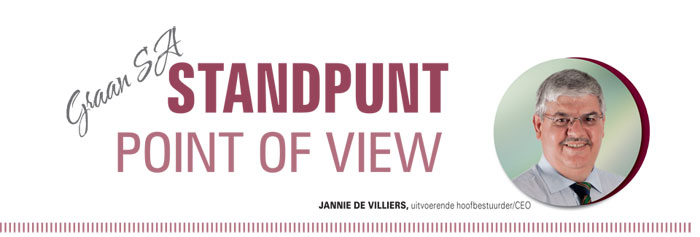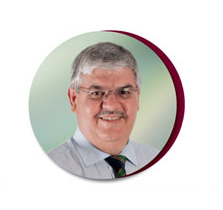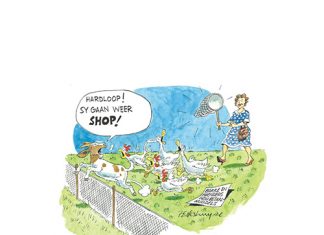June 2016

JANNIE DE VILLIERS, uitvoerende hoofbestuurder/CEO
The past few months between Grain SA’s congress and the NAMPO Harvest Day passed relatively quietly. As quiet as a school boy who got a hiding from the headmaster. The drought is cutting deep into the industry!
There were, however, a few fundamental issues that received serious consideration: The country’s constitution gained new status thanks to Ms Thuli Madonsela and brave judges who do not allow themselves to be influenced by politicians. While producers still have land reform hanging like a sword over their heads and while they are caught in the grip of the drought, this was definitely a huge victory.
In agriculture-related meetings and discussions in passages, I observed something new: The transformation motive is becoming the new portal to more control by the State. Generalisations such as: ‘No transformation has taken place in agriculture over the past 20 years’ are now becoming the most important driving force for the State to make inroads into the market.
It just makes me wonder whether South Africa will first have to experience famine (like during the period before the Constitutional Court ruling) before Government will realise that one ought not interfere with the free market if you want to have sufficient food for the country?
Transformation is essential, but if it is implemented without keeping sustainability in mind, it will cost the country dearly. Eskom taught us that hasty decisions and an overzealous drive of political motives lead to nonsustainability. It costs the country millions of rands in economic growth and job opportunities. Organised agriculture will have to keep an open mind to ensure that we do not do the one while failing to do the other. Sustainability depends on sound business principles.
One thing that is becoming more and more clear to me, is that the industry will have to privatise more. The budget for research has been reduced once again. The State-controlled seed multiplication project has derailed. Grain SA could not succeed in persuading the milling and baking industry to support the introduction of a statutory levy for wheat seed production. We will have to think strategically regarding who will be our real partners in future. I am encouraged by the hands (and rands) of co-operation extended to Grain SA and the agricultural sector during this difficult year. We will remember this for a long time! Thank you.
I have recently travelled through large parts of the Free State production areas. Whence feed for the animals will come this winter, I do not know. We are, however, pleased for those producers lucky enough to indeed have a crop – especially with prices being at a good level.
The Western Cape have experienced good planting conditions and we hope that they, especially the Swartland area, will have a normal year. There are also a number of chaps in the Free State who are planting wheat on fallow maize lands. Grain SA wishes to forewarn every grain producer to budget carefully – the export parity for maize in 2017 does not look favourable.
The State is seriously questioning the wheat tariff dispensation (and it is not to increase the tariff!). The solutions for the high food prices resulting from the drought and the poor exchange rate are now considered through lower prices to producers, and that is not sustainable. When are we ever going to learn?
Publication: June 2016
Section: Features


















